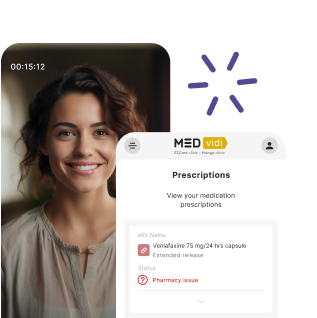Highlights
- Focalin and Ritalin are medications used to treat ADHD symptoms. They are in the same ADHD medication class called stimulants.
- Ritalin and Focalin are trade names for the generic medications dexmethylphenidate and methylphenidate HCL.
- You need a diagnosis of ADHD before a healthcare provider will consider prescribing Focalin or Ritalin to you. Note that you may be offered other treatment options.
The first step to managing attention deficit hyperactivity disorder (ADHD) is getting your diagnosis, and you feel relieved. Next, your healthcare provider will discuss treatment options with you, which might include medication. As the saying goes, knowledge is power, and knowing a bit about medication options is a great idea.
In this article, we’ll discuss two medicines commonly used for managing ADHD: Focalin and Ritalin.
Get a diagnosis online

Let’s start with the basics; both Focalin and Ritalin are in the same drug class called stimulant medications, which are
So, how do they control ADHD symptoms?
How Do Focalin and Ritalin Work?
ADHD symptoms are believed to be a result of
Focalin and Ritalin
In addition, Ritalin has also been Food and Drug Administration (FDA) approved to treat narcolepsy, a disorder that makes people very sleepy during the day, resulting in sudden “sleep attacks.”
As you can see, they work in the same way, but does this mean everything else about them is similar?
Key Differences Between Focalin and Ritalin
Focalin and Ritalin are the medication trade or market names; dexmethylphenidate is actually the generic or active substance in Focalin, and Ritalin is methylphenidate hydrochloride (HCL). The generic names sound similar, don’t they? That’s because of their structure. Let’s look at it in more detail:
- Ritalin is made up of
two mirror-image forms of the same building block[6] (like left and right hands), ‘D’ and ‘L.’ But only one form — the “D” form — is active. - Focalin only contains the active ‘d’ molecule.
To explain it simply, Focalin is a more pure and potent form of Ritalin.
So, the main differences between Ritalin and Focalin relate to their potency, which then affects the dosages. In theory, a lower dose of Focalin is needed to get the same effect as Ritalin. We’ll look at the Focalin vs. Ritalin dosage and other differences in the table below.
Table 1. Key differences — Focalin versus Ritalin
FOCALIN | RITALIN | |
Used for | ADHD | ADHD |
Active ingredient | Dexmethylphenidate | Methylphenidate HCL |
Formulations | Focalin tablets (immediate-release) 2.5 mg, 5 mg, and 10 mg. Focalin XR capsules (extended-release) 5 mg, 10 mg, 15 mg, 20 mg, 25 mg, 30 mg, 35 mg, and 40 mg | Ritalin tablets (immediate-release) 5 mg, 10 mg, and 20 mg Ritalin LA capsules (extended-release) 10 mg, 20 mg, 30 mg and 40 mg |
How long do they last | Immediate-release = 3 to 4 hours | |
Maximum dose | Focalin tablets: 20 mg Focalin XR capsules: 40 mg | Ritalin tablets and Ritalin LA capsules: 60 mg |
Cost estimate | Focalin XR 10 mg = $17.73 per capsule Dexmethylphenidate 10 mg = $2.20 per generic tablet | Ritalin LA 20 mg = $15 per capsule Methylphenidate HCL 20 mg = $1.72 per generic tablet |
Typical Adult Dosages |
| Ritalin tablets:
|
|
|
Typical dosages are provided for informational purposes only. Please consult your healthcare provider and follow their instructions; never exceed the prescribed dose.
Effectiveness of Focalin vs. Ritalin for ADHD
You’d think that because Focalin is more potent, it is more effective, right? Unfortunately, when comparing Focalin versus Ritalin in terms of how well they work, there is no straightforward answer; four things come into play:
- The individual taking the medication: Everyone reacts differently to medication.
- Potency: Focalin 1mg is as potent as Ritalin 2 mg.
- Dosage: A higher dose usually has stronger side effects.
- How long the effect lasts: Long-acting formulations work up to 12 hours and immediate-release — only 4 hours. (Individual responses may vary.)
Learn more: How Long Does Ritalin Stay in Your System?
Your healthcare professional will decide whether Focalin or Ritalin will be the better first option to try. They will consider:
- Your medical history and
- Whether you flag any warnings.
Warnings
Focalin and Ritalin are Schedule II controlled substances because they have the potential for misuse, abuse, and addiction. Importantly, you should only take them when prescribed by a healthcare provider for FDA-approved uses; do not take Focalin or Ritalin offered by a friend.
You cannot or might not be able to take either of these stimulant medications if you have:
- A risk of or history of addiction and dependence
- An allergy to the medication itself
- Heart problems
- A high heart rate
- High blood pressure
- Poor blood circulation to the hands and feet
- Tics or Tourette syndrome
- Bipolar disorder with manic episodes
- Psychosis: seeing, hearing, or believing things that aren’t real
- A history of aggression
- High eye pressure
- Epilepsy or a history of seizures

Side Effects of Focalin and Ritalin
Focalin and Ritalin also have many side effects in common because of their ‘active’ building blocks and action in the brain.
In theory, because a lower dose of Focalin vs Ritalin can lead to the same symptom control, there are fewer side effects with Focalin. However, this is not always the patient’s experience.
Table 2. Focalin vs Ritalin side effects
|
FOCALIN |
RITALIN |
|
|
Unique side effects |
Fever |
— |
|
Shared side effects |
With potentially serious consequences:
More common and less serious:
|
|
Importantly, although the effects on blood pressure and heart rate are usually minor, blood pressure and pulse must be checked regularly to avoid missing changes.
Not only do Focalin and Ritalin have overlapping side effects, but they interact with several medications in the same way.
Drug Interactions
Let’s look at some more common medications that might clash with Focalin and Ritalin and could have serious outcomes:
- Monoamine oxidase inhibitors: You are not allowed to use Focalin or Ritalin if you are taking these medications because of the
risk of dangerously high blood pressure[12] . - Other antidepressants: Very rarely, a life-threatening reaction called serotonin syndrome can occur if Focalin or Ritalin are taken with tricyclic antidepressants, serotonin-norepinephrine reuptake inhibitors (SNRIs), or selective serotonin reuptake inhibitors (SSRIs).
- All blood pressure medications: Focalin and Ritalin might result in blood pressure medication, including beta-blockers, not lowering blood pressure well.
- Certain anesthetics: There might be an increased risk of a surge in heart rate and blood pressure.
- Risperidone: There is an increased risk of stiffness, tremors, and restlessness.
- Anti-seizure medications: There is a chance of anti-epileptic medication toxicity.
These are only the most important interactions, but there is always potential for others. So, always tell your healthcare provider about all medication you are taking, even over-the-counter ones like flu medication or supplements.
Focalin or Ritalin: Which Is Right for You?
When it comes to managing ADHD symptoms, there isn’t a simple answer to whether Focalin or Ritalin will be the right choice for you. Your healthcare provider will decide on a treatment plan after considering:
- The severity of your ADHD
- Your medical history
- What other medications you are taking
- How long you need symptom control during the day
- Your budget
You can always change medication later, guided by your healthcare provider.
Switching from Ritalin to Focalin might be necessary if side effects make your life difficult. Likewise, if taking Focalin XR is too expensive, it might be worth trying Ritalin or a generic medication instead.
If taking stimulants is not an option for you because of your medical history, don’t worry; there is another, non-stimulant class of ADHD medication that your healthcare provider may prescribe.
How to Get a Prescription for Focalin & Ritalin
Focalin and Ritalin are prescription ADHD medications only available from a healthcare professional who will decide on a personalized ADHD treatment plan. This may include therapy, medication, or both. If medication is appropriate, your clinician may still choose something other than Focalin or Ritalin.
So, if you have just been diagnosed with attention deficit hyperactivity disorder, or if your current medication is not working well, book an appointment at MEDvidi to get ADHD treatment online and find out if Focalin or Ritalin would be appropriate for you.
FAQs
Are Ritalin and Focalin the same thing?
How do you switch from Ritalin to Focalin?
Are dexmethylphenidate and methylphenidate the same thing?
No, dexmethylphenidate and methylphenidate are not the same thing, although they both treat ADHD and sound similar. Methylphenidate HCL
Which is stronger, dexmethylphenidate or methylphenidate?
Are Ritalin and Focalin safe for long-term use?
ADHD medication is usually long-term, and ongoing use of Ritalin in adults usually has













